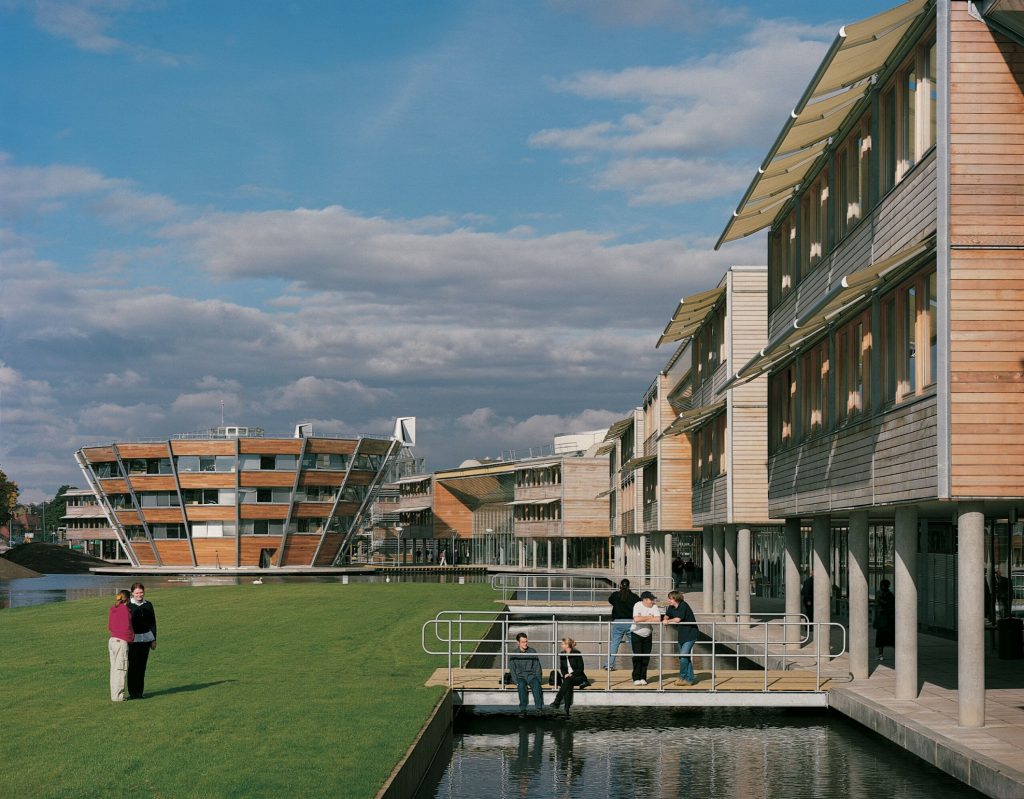While the Russell Group universities are widely recognized, there are other university leagues in the UK that shouldn’t be overlooked. In this post, we will explore these UK university leagues, shedding light on their notable institutions and the unique opportunities they provide for students. If you’re curious about the diverse higher education landscape in the UK, join us to discover other esteemed UK university groups.

If you’re thinking about studying in the UK, it’s crucial to find the right student accommodation. That’s where uhomes.com comes in. It’s a reliable platform that helps students like you find the perfect place to live in London, Manchester, Nottingham, Newcastle, Leeds and many other cities.
The Russell Group: UK Ivy League
The Russell Group, a consortium of 24 prestigious UK universities, is often perceived as the standard for top-tier education. Understanding the Russell Group and its significance is crucial for students and those navigating the university selection process. In this section, we’ll explore the Russell Group’s formation, purpose, membership, and influence, highlighting its significance in higher education.
Formation and Purpose of the Russell Group
The Russell Group traces its origins back to 1994 when it emerged as a consortium of 17 research-intensive universities in the UK. Initially, a series of informal meetings at the Russell Hotel in Russell Square led to the formation of this influential group. Over time, the consortium expanded and now comprises 24 universities, including esteemed institutions such as Oxford, Cambridge, Imperial, Manchester, Southampton, and Liverpool.
The primary purpose of the formation of the Russell Group is to provide strategy, policy development, communication, and advocacy for its member institutions. The focus is on collaboration and influencing government policies rather than claiming exclusive superiority. It’s important to recognize that the Russell Group does not position itself as the sole benchmark of excellence.

Membership and Prestige
The Russell Group universities are widely regarded as prestigious and are often associated with academic excellence. Their membership in the Russell Group is considered a mark of distinction by many, both within and outside the education sector. The reputation of the Russell Group universities stems from their long-standing history, research output, notable alumni, and rigorous academic standards.
Influence and Collaboration
The Russell Group comprises 24 universities, but these few institutions hold significant influence in the UK. They account for over 65% of all research funding and sponsorship in British universities, showcasing their wide-ranging academic reputation and research capabilities across the United Kingdom.
The University of Cambridge, the University of Oxford, the London School of Economics and Political Science, University College London, King’s College London, and Imperial College London are among the prestigious universities within the Russell Group. These elite institutions consistently rank at the top of major university rankings, reinforcing their position as leaders in academic excellence.
The Russell Group universities go beyond their reputations and team up to influence and collaborate on shared interests. They use the consortium as a platform for strategic planning, policy development, communication, and advocacy. By working together, they can make a collective impact on government education policies, funding decisions, and more. This collaborative approach helps them tackle common challenges and promote the interests of research-focused institutions.

Current Members of the Russell Group
- University of Birmingham
- University of Bristol
- University of Cambridge
- Cardiff University
- Durham University
- University of Edinburgh
- University of Exeter
- University of Glasgow
- Imperial College London
- King’s College London
- University of Leeds
- University of Liverpool
- London School of Economics and Political Science (LSE)
- University of Manchester
- Newcastle University
- University of Nottingham
- University of Oxford
- Queen’s University Belfast
- University of Sheffield
- University of Southampton
- University College London (UCL)
- Queen Mary University of London
- University of Warwick
- University of York
The G5: A League of Prestige in UK Higher Education
The G5, also known as the Golden Triangle, consists of five prestigious UK universities: Oxford, Cambridge, Imperial College London, LSE, and Edinburgh. They’re renowned worldwide for their academic excellence. Students worldwide choose these institutions for top-tier education.
Tradition and Excellence: Oxford and Cambridge
Oxford and Cambridge, also known as Oxbridge, are the oldest universities in the English-speaking world, with a history of over 800 years. They’re famous for their tough academic standards, tutorial-style teaching, and cutting-edge research in various fields. The collegiate system at Oxbridge creates a special learning environment that encourages intellectual growth and critical thinking. It’s a truly unique and immersive academic experience.
Cutting-Edge Research and Innovation: Imperial College London
Imperial College London is recognized for its exceptional focus on science, engineering, medicine, and business. With a commitment to pushing boundaries and driving innovation, Imperial College is at the forefront of groundbreaking research and technological advancements. The university’s strong emphasis on interdisciplinary collaboration and its close ties with industry create an environment that nurtures pioneering ideas and fosters entrepreneurial spirit.
Social Sciences and Economics: London School of Economics and Political Science (LSE)
LSE is famous worldwide for its social sciences, economics, law, and international relations expertise. It draws students who are passionate about understanding complex societal issues. They get access to top-notch faculty, cutting-edge research centers, and an active intellectual community. LSE’s interdisciplinary approach equips students with the know-how to face real-world challenges and make a difference in shaping global policies.
Multidisciplinary Excellence: University of Edinburgh
The University of Edinburgh, located in Scotland’s historic capital, is distinguished by its multidisciplinary approach to education and research. With a wide range of academic programs spanning arts, humanities, sciences, medicine, and social sciences, the university offers students a diverse and inclusive learning environment. Edinburgh’s commitment to innovation and collaboration, coupled with its strong ties to industry, facilitates transformative discoveries and prepares students for successful careers in their chosen fields.
The 1994 Group: A Collective of Research-Intensive Universities
The 1994 Group, a UK association of research-intensive universities, had a notable impact on higher education. While it’s now defunct, its history offers insights into collaborative efforts among universities emphasizing research and teaching excellence.
Formation and Purpose of the 1994 Group
The 1994 Group was established in 1994 and consisted of a dozen universities that had gained university status in the United Kingdom between 1962 and 1992. These universities shared a commitment to high-quality research and teaching. The group aimed to provide a platform for collaboration, knowledge-sharing, and advocacy in matters related to higher education policy, funding, and research.
Collaborative Research and Teaching Excellence
One of the key objectives of the 1994 Group was to foster collaborative research initiatives among its member institutions. By pooling their resources and expertise, these universities aimed to enhance their research output, attract funding, and contribute to advancements in various fields. The group also emphasized the importance of teaching excellence, aiming to improve pedagogical approaches, promote innovative teaching methods, and support the professional development of lecturers.
Evolution and Dissolution of the 1994 Group
As time passed, the UK’s higher education scene changed, affecting university groupings. In 2013, the 1994 Group dissolved as some universities joined different alliances or went their own way. Some joined the Russell Group, while others formed new collaborations or stayed independent. Although the 1994 Group is gone, its legacy of promoting research and teaching excellence lives on in the participating universities.
Former Members of the 1994 Group
- Birkbeck, University of London
- University of East Anglia
- University of Essex
- Goldsmiths, University of London
- Institute of Education, University College London
- Lancaster University
- University of Leicester
- Loughborough University
- Queen Mary University of London
- University of Reading
- Royal Holloway, University of London
- University of St Andrews
- School of Oriental and African Studies (SOAS),
- University of London
- University of Sussex
White Rose University Consortium
The White Rose University Consortium is an alliance of three research-intensive universities in the North of England: the University of Leeds, the University of Sheffield, and the University of York. Established to foster collaboration and knowledge exchange, the consortium plays a pivotal role in enhancing research, teaching, and innovation in the region and beyond.
Formation and Purpose of White Rose University Consortium
The White Rose University Consortium was founded in 1997 with the aim of leveraging the collective strengths of its member institutions. By pooling resources, expertise, and facilities, the consortium sought to create a collaborative environment that promotes interdisciplinary research, drives innovation, and enhances the student experience. The shared purpose of the consortium is to deliver impactful research outcomes, provide high-quality teaching, and contribute to the economic and social development of the region.
Collaboration in Research and Teaching
The White Rose University Consortium facilitates collaboration in various areas, including research and teaching. Through joint research projects, interdisciplinary initiatives, and knowledge sharing, the consortium fosters innovation and tackles complex challenges. The universities collaborate in areas such as healthcare, digital technologies, sustainable development, arts and humanities, and social sciences. Additionally, they offer joint postgraduate training programs and share expertise to enhance teaching quality and student support.
Current Members and Areas of Focus
- University of Leeds: Known for its strengths in fields such as medicine, engineering, social sciences, and business.
- University of Sheffield: Renowned for its expertise in areas like advanced manufacturing, materials science, bioscience, and social sciences.
- University of York: Recognized for its strengths in disciplines such as humanities, sciences, computer science, and economics.
Red Brick University
Red Brick Universities, comprising six renowned institutions, are an integral part of the United Kingdom’s educational landscape. These universities, namely the University of Bristol, the University of Sheffield, the University of Birmingham, the University of Leeds, the University of Manchester, and the University of Liverpool, share a rich history and notable academic achievements.
These universities, alongside Cambridge and Oxford, are key players in the UK. Founded during the Victorian era amid the Industrial Revolution, they were initially science or engineering institutions in major industrial cities, earning Royal Charters before WWI.
It is worth mentioning that all six universities are members of the prestigious Russell Group, further attesting to their commitment to research excellence and academic standing.

N8 Research Partnership
The N8 University Consortium, established in 2007, comprises eight leading research universities in Northern England. Like the White Rose Consortium, it aims to enhance collaboration and collective strengths through research team exchanges. It maintains partnerships with global academic groups, fostering cutting-edge virtual networks and facilitating interdisciplinary knowledge advancement. With £65 million in annual research funding and over 18,000 academic researchers, it’s one of the UK’s largest research communities, actively bridging academia-industry gaps to foster collaboration and secure funding.
Members of the N8 Research Partnership
- Durham University
- Lancaster University
- University of Leeds
- University of Liverpool
- Newcastle University
- University of Manchester
- University of Sheffield
- University of York
Related Posts
UK University Leagues FAQ
Yes, G5 universities are renowned for their academic excellence, research prowess, and influential alumni networks, making them highly regarded institutions globally.
Admission requirements vary depending on the university and program. Generally, G5 universities have highly competitive admission processes, considering academic performance, standardized test scores, personal statements, and letters of recommendation.
Students can apply to G5 universities through their respective admissions offices or online portals, following the specific application procedures and deadlines for each institution and program.
Red Brick Universities refer to a group of nine civic universities founded in major industrial cities of England during the late 19th and early 20th centuries. The term “Red Brick” originates from the distinctive red brick buildings that characterize these universities’ campuses.
Red Brick Universities are known for their strong emphasis on science and engineering education, as well as their historical ties to the Industrial Revolution and the expansion of the British Empire.
UK University Leagues can serve as a starting point for researching universities and identifying institutions that match your academic interests, career aspirations, and personal preferences. However, it’s essential to delve deeper into each university’s offerings and visit campuses if possible.








